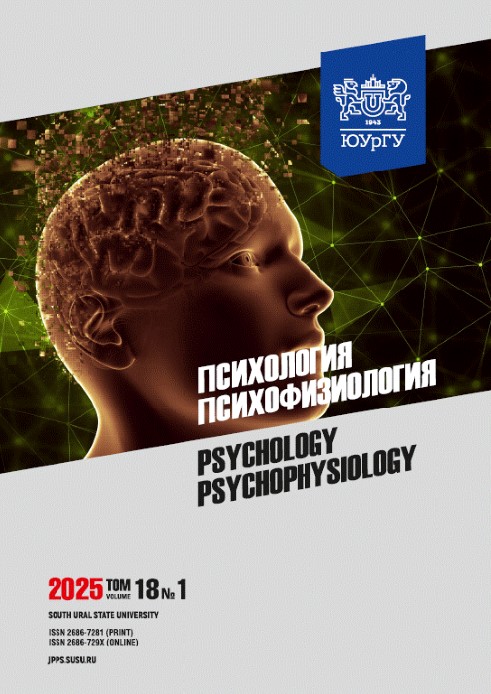Dynamics of psychological regulation in production workers: weekly cycle analysis
Abstract
Introduction. This study investigates the role of cognitive structures, including reflection, the self-system, life-purpose orientations, and subjective experiences, in regulating the dynamic fluctuations of mental states among production workers across a weekly cycle. Grounded in a structural-functional model of mental state regulation, this research aims to elucidate the temporal patterns and regulatory mechanisms underlying workers’ psychological adaptation. Materials and methods. The sample involved 31 industrial workers (15 males, 16 females, mean age = 42 years). Participants first completed baseline assessments of key psychological structures. Subsequently, daily monitoring of mental states and self-regulation strategies was conducted over a week. Results. Analysis revealed relative stability in mental states over a weekly cycle, with sinusoidal fluctuations in intensity. Regulatory engagement of cognitive structures peaked at the end of the workweek (Thursday–Friday), while Monday exhibited minimal metacognitive involvement. Workers maintained relative stability through self-regulation techniques, including guided imagery, task-switching, and mental engagement in/disengagement from work-related activities. Conclusion. Network analysis demonstrated increasing functional connectivity among regulatory processes from Tuesday to Friday, followed by a decline in cognitive engagement by Saturday.
Downloads
References
2. Znakov V.V. Dynamic approach to personality research and process analysis in the psychology of the subject. Psihologicheskii zhurnal = Psychological journal. 2019;5:27–34. (in Russ.). DOI: 10.31857/S020595920006073-6
3. Vekker L.M. Psihika i realnost: edinaya teoriya psihicheskih processov [Psyche and reality: a unified theory of mental processes]. Moscow. Smysl Publ. 1998:685. (in Russ.).
4. Ganzen V.A. Sistemnye opisaniya v psihologii [Systemic descriptions in psychology]. Leningrad. Leningradskiy universitet Publ. 1984:176. (in Russ.).
5. Saveliev A.V., Deryabina G.I., Lerner V.L. Dynamics of pre-competition mental states of athletes (on the example of the womens volleyball team). Nauka i sport: sovremennye tendencii = Science and Sport: Modern Trends. 2019;3:50–56. DOI: 10.36028/2308-8826-2019-7-3-50-57. (in Russ.).
6. Galoy N.Yu. Pandemic a Year Later: Dynamics of Mental State in Conditions of Uncertainty. Vestnik universiteta = University Bulletin. 2021;12:185–194. (in Russ.).
7. Gaponova S.A., Martynova N.A. Dependence of the Dynamics of Mental States of Adult Students on the Methods of Presenting Information. Psihologicheskii zhurnal = Psychological Journal. 2003;24(6):86–94. (in Russ.).
8. Lysenko Yu.N. Dynamics of mental states of cadets during the school day. Psihologicheskie aspekty innovacionnoi deyatelnosti v obrazovatelnoi sfere = Psychological aspects of innovative activities in the educational sphere. 2008;9:48–55. (in Russ.).
9. Fomina T.G., Potanina A.M., Bondarenko I.N., Morosanova V.I. Dynamics of school involvement and its relationship with the development of conscious self-regulation in adolescents. Eksperimentalnaya psihologiya = Experimental Psychology. 2022;15(4):167–180. (in Russ.). DOI: 10.17759/exppsy.2022150411.
10. Handbook of Self-Regulation: Research, Theory, and Applications. Eds. Vohs K.D., Baumeister R.F. Guilford Publications. New York. 2017:640.
11. Inzlicht M., Werner K.M., Briskin J.L., Roberts B.W. Integrating Models of Self-Regulation. Annual Review of Psychology. 2021;72(1):319–345. DOI: 10.1146/annurev-psych-061020-105721.
12. Roth G., Vansteenkiste M., Ryan R.M. Integrative emotion regulation: Process and development from a self-determination theory perspective. Development and psychopathology. 2019;31(3):945–956. DOI: 10.1017/S0954579419000403.
13. Zhang Q., Miao L., He L., Wang H. The Relationship between Self-Concept and Negative Emotion: A Moderated Mediation Model. International journal of environmental research and public health. 2022;19(16). DOI:10.3390/ijerph191610377.
14. Arslan E. Investigation of pre-school childrens self-concept in terms of emotion regulation skill, behavior and emotional status. Anales de Psicología. 2021;37:508–515. DOI: 10.6018/analesps.364771.
15. Orvell A., Vickers B., Drake B. et al. Does Distanced Self-Talk Facilitate Emotion Regulation Across a Range of Emotionally Intense Experiences? Clinical Psychological Science. 2020;9:68–78. DOI: 10.1177/2167702620951539.
16. Thornton M., Rmus M., Tamir D. People learn mental state concepts from mental state dynamics. 2020:40. DOI: 10.31234/osf.io/kbcsj.
17. Thornton M., Rmus M., Vyas A.D., Tamir D. Transition Dynamics Shape Mental State Concepts. Journal of Experimental Psychology: General. 2023;10:2804–2829. DOI: 10.1037/xge0001405.
18. Prokhorov A.O. Mental mechanisms of regulation of mental states. Eksperimentalnaya psihologiya = Experimental Psychology. 2021;14(4):182–204. (in Russ.).
19. Prokhorov A.O. Situational aspects of mental regulation of mental states. Teoreticheskaya i eksperimentalnaya psihologiya = Theoretical and Experimental Psychology. 2023;4(16):13–27. DOI: 10.11621/TEP-23-26. (in Russ.).
20. Kartasheva M.I. The role of the Self-system in the structure of mental regulation of mental states in the process of educational activity. Yaroslavskii pedagogicheskii vestnik = Yaroslavl Pedagogical Bulletin. 2022;1(124):162–174. (in Russ.). DOI: 10.20323/1813-145X-2022-1-124-162-174.
21. Prokhorov A.O., Chernov A.V. Development of mental regulation of students mental states in the learning process. Psihologicheskii zhurnal = Psychological journal. 2024;45(3):41–53. (in Russ.). DOI: 10.31857/S0205959224030044.
22. Morosanova V.I., Kondratyuk N.G. Questionnaire of V.I. Morosanova “Style of Self-Regulation of Behavior – SSPM 2020”. Voprosy psihologii. 2020;4:155–167. (in Russ.).
23. Prokhorov A.O., Chernov A.V. Refleksivnaya regulyaciya psihicheskih sostoyanii. [Reflexive regulation of mental states]. Moscow. Publ. Institut psihologii RAN. 2019:191. (in Russ.).
24. Karpov A.V. Psihologiya refleksivnyh mekhanizmov deyatelnosti [Psychology of reflexive mechanisms of activity]. Moscow. Publ. Institut psihologii RAN. 2004:421. (in Russ.).
References on translit
-Copyright (c) 2025 Psychology. Psychophysiology

This work is licensed under a Creative Commons Attribution-NonCommercial-NoDerivatives 4.0 International License.



